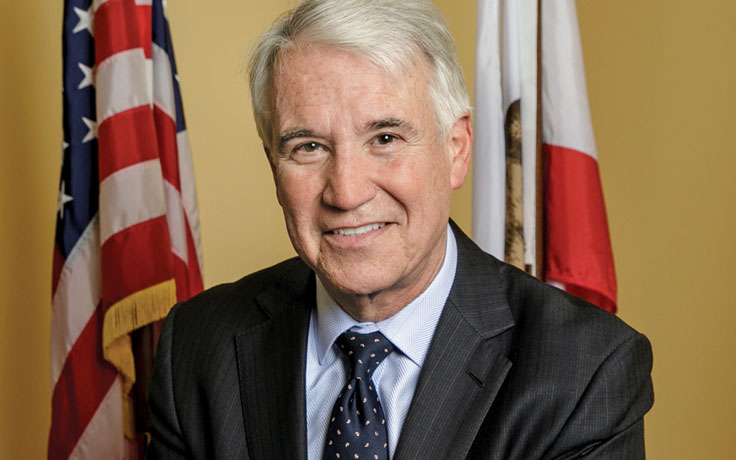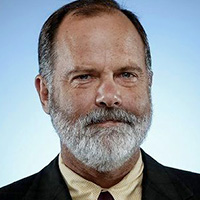GEORGE GASCÓN PROBABLY QUALIFIES AS A MODERATE by San Francisco standards, but those standards are hardly the national norm. A former Los Angeles police officer and Mesa, Arizona, police chief, Gascón has been chief of police in San Francisco, as well, and now serves as its district attorney. That puts him squarely in the crosshairs of tension between local and federal priorities. Jeff Sessions wants city police to enforce federal marijuana laws. George Gascón refuses to do it. Indeed, he has removed convictions in marijuana cases going back to the 1970s. Donald Trump wants more deportations and demands that local authorities enforce federal immigration laws. George Gascón refuses to do it. Indeed, he has offered protection to many of those targeted by the federal government.
One might think this would leave Gascón, who is Cuban by birth, in a quandary. One would be wrong. He is determined to enforce the laws of California and San Francisco, and he is willing to court disfavor with Trump and his administration to do so.
Gascón and Blueprint editor Jim Newton met recently in Gascón’s San Francisco office to discuss growing pressure on local officials who defy the federal government. They began by considering Special Order 40, promulgated by Los Angeles Police Chief Daryl F. Gates in 1979. It prohibits Los Angeles officers from stopping people on suspicion that they are in the country illegally. Meant to encourage community cooperation with police, it has been attacked as giving sanctuary to illegal immigrants.
Blueprint: You grew up in an LAPD that has Special Order 40. Did you ever feel that the order made your life as a police officer more difficult?
George Gascón: No, to the contrary. Special Order 40 not only provided a way for me and the department to establish a certain level of trust with segments of our community, but, more importantly I got to see the reverse. If I can take you back through memory lane, we had the Rampart scandal. Those officers who went rogue would often threaten members of the community that if they did not cooperate with the police, they would
take them to the immigration building. And they did. The result was that the community, which already was distrustful of the LAPD … this put that on steroids. The community knew that the police were not going to be effective, and gangs took over territory.
BP: And did you see similar effects when you went to Mesa as chief?
GG: Yes. Here’s a place where I was trying to moderate the process to make sure the community had trust in us, but we were doing it in the background of a sheriff [Joe Arpaio, whose detentions of illegal immigrants made him a national figure and earned him a criminal
conviction, followed by a pardon from Trump] who was basically declaring all-out war on the Latino community and immigrants. They were, on a regular basis, coming into my city and picking people up.
It got so ugly that they got search and arrest warrants, and one evening they came in around 1 o’clock in the morning without telling us, and they served warrants at the main public library and the city administrationbuilding … to see whether the cleaning crews had papers.
It was really an attack on me because in the Mesa structure, the police department issued employee IDs and did background checks on contractors appropriate to the jobs they were doing. Somebody accused me of not asking people for their immigration status when issuing these cards.
To make a long story short, they went in — and the reason I know this is that we had closed-circuit TV — they storm in with SWAT gear and large numbers of deputies, asking the janitorial staff for IDs. At the city administration building, everyone had appropriate documentation, so no one got arrested. At the library, there were two women who didn’t, who were undocumented, and they got arrested. One was a mother. She was hauled away, and her kids were left alone.
Early on, I had the consul general of a Latin American country come to me asking for help because they had a young woman who had been brutally sexually assaulted. She knew who the assailant was. She was afraid to go to the hospital for services because in Arizona, there were even people being turned over to immigration at hospitals. … So here is this victim of a brutal sexual assault with a known suspect. She never comes to the authorities. She’s even afraid even to get medical help.… The woman eventually went back to her native country. We found out later that this same individual [the assailant] went on to rape another woman who happened to be a U.S. citizen.
I can give you example after example of how this creates a horrible situation at the local level.
BP: How does that compare to today’s San Francisco?
GG: This is a sanctuary city. We work really hard to let our community know that they will not be subject to immigration detention if they work with us, but we’re having cases where victims of crimes are now refusing to come to court because they’re fearful that just coming into the building will lead to their arrest.
BP: I suspect if a representative of the Trump administration were here, he would say that by creating such a protective environment for those who are here illegally, you encourage more people to come, and that deepens your crime problem over time. How do you respond to that?
GG: I think there are fundamentally many things wrong with that train of thought. For one, people migrate from one place to another primarily for economic or political reasons. The immigration that we have had for generations from Latin America, mostly Mexico, and now from Asia, is primarily driven by economics. You have nations that do not have the economic opportunities for their people, and you have an incredible thirst in this country for certain types of labor.
So what you have is a market-driven movement of people. By creating the levels of control that we have without addressing the market drivers, we have actually created a worse problem.
If you go back years ago when people could freely cross borders, a lot of the men who came to work here, their families would stay home, and they would go back regularly. As they started to tighten up the borders, it became increasingly difficult for people to go back and forth. Now they send money back home, but they stay here. And after years, people start to drift further and further from their families. They end up creating a second family here. In Latin America, especially Mexico, you have towns where the men are all gone. You have families without the presence of a father. And then you have the creation of a new family here. The social complexities of that, which very few people understand, are driven by bad immigration policy.
I don’t care how big a wall you build, you must address the desperation. My family and I are immigrants. We came from Cuba. We did not have a wall to cross. We had a gulf to cross. And most people in the early years were unsuccessful. They were dying. That gulf never kept people from jumping in with inner tubes, crazy stuff, because there’s a human drive that is going to take people from a place where they are unwelcome — whether it’s economically, politically or religiously — and they’re going to look for a better life for their families. Walls do not stop that from occurring.
That’s No. 1. No. 2, that assessment that you’re inviting crime is disingenuous. There are a number of studies now that show the immigrant communities are less likely to engage in crime than people who are not immigrants.
BP: I was going to ask you: Based on your experience here in San Francisco, do you have any reason to believe that immigrants are more likely to commit crimes than non-immigrants?
GG: The opposite. … It’s the second or third generation of people in this country who are more likely to engage in criminal conduct. Why? Immigrants come here to work. They don’t come here to commit crimes. There are always exceptions … but as a rule, the last thing they want to do is call attention to themselves.
My parents were terrified of even seeing a police car. They were traumatized by the Cuban experience. My mom would start shaking if there was a police car behind us, and she would ask my dad to pull over. They came here to work, and they wanted to keep a low profile. And
they at least had legal authority to be here. Imagine if you don’t. You’re terrified. You don’t want to call attention to yourself, and if you start committing crimes, you call attention to yourself.
BP: You mentioned Sheriff Arpaio a moment ago. One thing many people, myself included, have wondered about is why it is objectionable for Arpaio to adopt an immigration policy while it’s OK for a place like San Francisco to adopt a sanctuary policy. What’s the difference?
GG: The federal government doesn’t expect us to enforce Internal Revenue Service rules. We don’t go around trying to figure out whether you paid your taxes or not. There’s probably more people in this city today cheating on their taxes than those who are undocumented.
At the local level, if we start becoming an arm for the immigration services, then what happens is that when your dishwasher or your cook contracts some kind of contagious disease, they’re not going to go to the hospital because they’re afraid that will lead to their deportation. So they suck it up, and then it becomes a health problem for all of us.
Just like we don’t do tax enforcement, we shouldn’t be doing this type of work. … Quite frankly, the federal government should welcome sanctuary cities and understand the separation of duties.
BP: Obviously, the federal government, at least the Trump administration, does not.
GG: There’s a whole area now of federal supremacy that the attorney general is arguing. … When he was a senator, he was always, always arguing for states’ rights. Now he happens to be attorney general, and he’s telling California: “Don’t do what I did or what I advocated for.” I find that disingenuous and hypocritical.
This is all a political stunt. You have a failing administration that is desperate to divert attention, and we make a perfect target for them because, in their view, we’re a political enemy.
BP: Imagine if the federal government said, “Homelessness creates crime, so we insist that you arrest all the homeless people in your city.” I don’t think anyone would conceive of that as constitutional or appropriate or helpful. And yet all you’re doing is changing the word from “immigrant” to “homeless.”
GG: One of the things I learned in Arizona very quickly was that the term “illegal immigrant … ”
BP: Or “illegal alien …”
GG: Or, yes, “illegal alien,” is a proxy for “I don’t like Mexicans.… I don’t like these brown people. I don’t want them here.” It’s all race-loaded.
BP: You don’t hear people complaining about French immigrants.
GG: When I was in Mesa, I lived in a community that was very heavily populated by Canadians, who were basically snowbirds. Sometimes they would overstay their visas, and some actually found work. There was nobody looking for illegal Canadians in Mesa.
BP: This isn’t really a legal argument, but one of the things I hear people in California say is: “Things are working pretty well here. There’s job growth. There’s economic growth. The budget’s balanced. Why would you want to upset all that?”
GG: Don’t touch a good thing.
BP: Did Jeff Sessions give you any notice that he intended to file a lawsuit against the state of California?
GG: Let’s just say that I’m not on Jeff’s Christmas list.
BP: What would an actual, constructive working relationship with the Department of Justice look like?
GG: A good relationship would start with: “I have a list of 20 people or 30 people who are violent felons.” As opposed to: “I have a list of 800 people, 600 of whom have no criminal history, 100 are low-level misdemeanors and 80 or less are serious felons.”
I believe I can speak for many others in law enforcement when I say: “I’m looking for this murderer, I’m looking for this rapist or this robber, and we need some help.” Those are serious conversations that should be
had. But if you bring me a list of 800 people that is going to take 700 dishwashers and cooks and gardeners who are here purely working their butts off … [then] we’re not going to work together. That’s not what I’m here to do. It needs to be that kind of conversation at the local level.
I’m not saying, necessarily, on a separate track, that immigration authorities should not do their own job. I’m not an open-borders proponent. I believe that a nation has a sovereign right to determine its immigration policies. What I don’t believe in is immigration policies
that are driven by race and by hate and by xenophobic arguments. That I do not believe in.

























